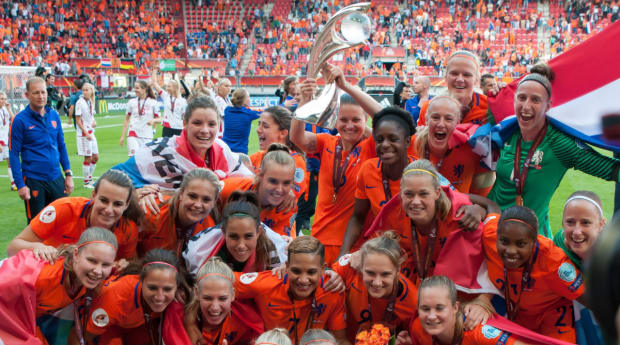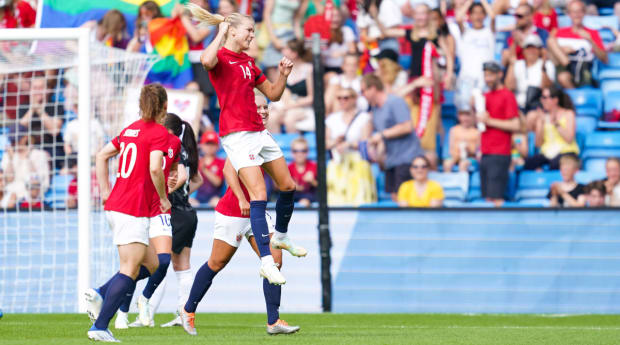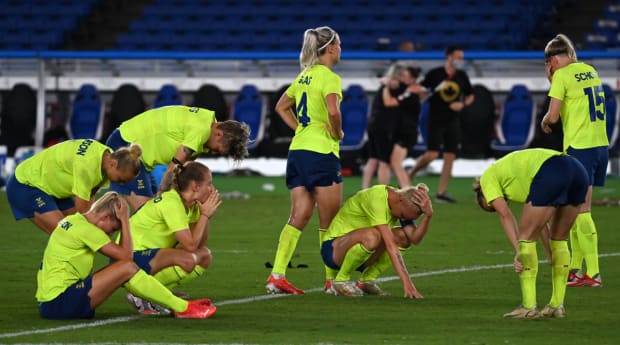View the original article to see embedded media.
With the men’s World Cup taking place in the fall, the UEFA Women’s Euros has taken over as the premier soccer tournament of the summer—and it’s widely expected to be the biggest Women’s Euros ever.
After being delayed for a year by COVID-19, the tournament kicks off July 6 with host nation England facing Austria. However, powerhouse matchups await just a few days into the tournament with Germany vs. Denmark and Netherlands vs. Sweden taking place before the end of the first weekend.
From the star players to the biggest teams and story lines, here is a brief look at some of what the Euros will offer this month leading up to the July 31 final in London.
Heavyweights
Netherlands
The Dutch enter the Euros as the defending champions after their dominant run to the 2017 title. Five years ago, the Netherlands won its first title by conceding only one goal leading up to the final. Meanwhile, star forwards Lieke Martens and Vivianne Miedema return knowing they are battle-tested, having contributed to five of the nation’s nine knockout stage goals in ’17.
Most importantly, the Netherlands comes into the tournament with critical experience after finishing second in the 2019 Women’s World Cup. And in England, it won’t have to worry about facing the United States, which defeated the Dutch in the final in France and in the Olympic quarterfinals last year. Never count out the defending champs, especially when they return so much experience and firepower.

IMAGO/foto2press
England
England is considered a favorite for a variety of reasons, but it all starts with the squad it’s put together. England’s depth is its truest strength with plenty of options across the board. In attack, Beth Mead comes in as the 2021–22 Women’s Super League assist leader, while Ellen White, the joint ’19 World Cup top scorer, is the country’s all-time leading scorer with 50 goals (the last of which came in a 20–0 win over Latvia in November in which four players scored hat tricks).
The Lionesses have not lost in their last 13 matches, and that includes an impressive 5–1 win over the Netherlands in June. And England also has a winner in Sarina Wiegman leading the side after the manager took the Netherlands to the 2017 title. England last hosted the Euros in ’05, when it failed to make it out of a tough group. Now, as host nation once again, the Lionesses are being counted on to do what the men’s team couldn’t last year: Validate the chants that football is coming home.
Spain
All eyes will be on Spain at the Euros, given all of its promise and talent, but it suffered a devastating injury on the eve of the competition. Reigning Ballon d’Or Féminin winner Alexia Putellas tore her ACL on the eve of the competition, and with star forward Jenni Hermoso also out with a knee injury, Spain is going to need a different set of heroes to remain a contender. It figured to be a force to be reckoned with thanks to its highly successful Barça Femení contingent. Eight Spain players who featured for Barcelona last season played in a recent 7–0 friendly win over Australia—and more key Barça players were on the bench.
In qualifying for the Euros, Spain outscored its opponents 48–1, and it has also qualified for the 2023 World Cup. Under manager Jorge Vilda, Spain has won plenty—but not when it mattered most. The side dropped out of the ’19 World Cup at the hands of the U.S. in the round of 16, while it was eliminated from the last Euros in the quarterfinals by Austria on penalties. This is, by all means, Spain’s best shot yet at the big time, but Alexia’s injury will ramp up the difficulty in its ability to match its 1997 achievement of reaching the semifinals.
(This article was initially published before the Spanish federation announced that Alexia suffered a torn ACL on Tuesday in training, and has since been altered to reflect the change to Spain’s outlook.)
Watch live soccer with fuboTV: Start a 7-day trial today!
Germany
Germany should never be counted out at a European Championship on any level, especially in a tournament where it has a history of excellence. No team has won more than Germany’s eight Women’s Euros titles, which included six straight until the streak ended in 2017. But this Germany team will feel it has a lot of making up to do after successive quarterfinal exits in the ’17 Euros and ’19 World Cup and missing out on the Tokyo Olympics altogether.
Germany will get that chance early in its group stage meeting with Euro 2017 runner-up Denmark, which shocked the Germans that year in the quarterfinals. Lurking in its group is Spain, meaning Germany will need all hands on deck just to go through to the knockouts. Its hopes rely heavily on a pair of prolific scorers in Bayern Munich forward Lea Schüller, who led the Frauen-Bundesliga with 16 goals last season, and Wolfsburg’s Tabea Waßmuth, who finished second in the Champions League and Frauen-Bundesliga in scoring.
Players to Watch
Ada Hegerberg
One of the sport’s best players is back on the international stage, and everyone seems to be better off for it. Hegerberg made the active decision to sit out the last five years from the Norwegian national team as a form of protest against how she felt the Norwegian federation treated women’s soccer. This year, Hegerberg announced her long-anticipated return, and she has the Euro trophy in her sights.
The 26-year-old Lyon forward is coming off a comeback year in which she returned from an ACL injury that kept her out for nearly two years to win the league and Champions League titles. But Hegerberg, the all-time leading scorer in Women’s Champions League history, has some unfinished business after Norway failed to score at the last Euros. And after opting out of the 2019 World Cup, Hegerberg is expected to be at her very best.

IMAGO/Sports Press Photo
Wendie Renard
The Lyon captain is one of the most decorated players of all time, having won 14 league titles and eight Champions League trophies, including this year’s dominant performance against powerhouse Barcelona Femení in the final. However, Renard lacks a major trophy on the global stage with France to pair with her club success—and the Euros represent one of her best chances.
The 31-year-old center back has made 131 caps for France and has participated in two World Cups and two Olympics. Renard also led the team in scoring at the 2019 World Cup on home turf with her four goals, showing her prowess in front of goal on set pieces and corners. With a league title and Champions League trophy already this season, Renard could very well be in the running for the Ballon d’Or Féminin, especially with a Euros win.
Vivianne Miedema
Miedema’s name may be overshadowed by some of the more famous scorers at the Euros, but the Dutch striker is a machine. The 25-year-old forward has scored 114 goals in 132 appearances for Arsenal over the last four seasons and has logged 22 goals in 19 caps for the national team over the last two years.
Miedema also broke the Olympic record with 10 goals from four matches, winning the Golden Boot despite the Netherlands’ quarterfinal exit. Meanwhile, she scored all four of her goals at the last Euros in the knockout stage en route to the nation’s first European title. If you see her name atop the goalscoring charts come July 31, it should come as no surprise.
Biggest Questions
Who are the dark horses?
It’s difficult to call Sweden a dark horse when it’s considered one of the favorites (and is a popular pundit pick to win it all). Sweden won silver at the Tokyo Olympics last summer after losing to Canada in the final and won the third-place medal at the 2019 World Cup after losing to the Netherlands in extra time of the semifinals. After getting losing in its last three Euro finals, this year is gearing up to be the one for Sweden. France is another team loaded with talent, while leaving lots of talent at home, like former captain and ’22 Champions League MVP Amandine Henry. However, the French will first have to make history of their own considering they have never reached a Euro semifinal.

IMAGO/Xinhua
Who is in the Group of Death?
The most obvious Group of Death is Group B with Germany, Denmark, Spain and Finland. Germany will kick off its Euro campaign with a chance to get revenge on Denmark, who knocked the Germans out of the last Euros and ended their streak of five straight Euro titles. Spain vs. Germany is also sure to entertain while Spain vs. Denmark on the final day of the group could very well decide which of the two advances to the knockouts. Also be sure to keep an eye on a tough Group C, which features Netherlands, Sweden, Switzerland and Portugal.
Why watch the final when you could watch the quarterfinals?
Netherlands vs. France, England vs. Spain, Sweden vs. France, England vs. Germany/Denmark are very realistic possibilities in terms of quarterfinal matchups. No one would be surprised to see any of these games end up as a potential Euro final, and that’s without taking into account underdogs like Italy and Austria. The winner of Group D (France is the favorite) seems to have the toughest road to the final with knockout matches potentially against Netherlands/Sweden, Germany/Spain/Denmark and then the final. If the quarterfinals end up like this, just imagine the potential of the semifinals with a trip to Wembley on the line.







